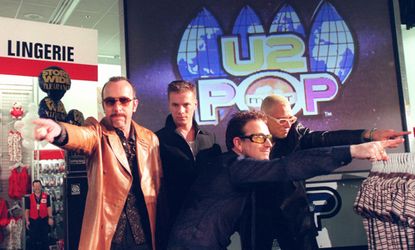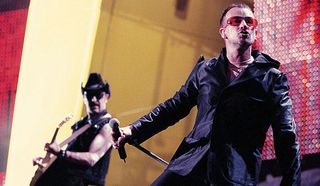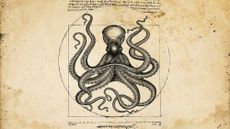In defense of Pop, U2's most hated album
In 1997, U2 descended into a phase of sinister, ironic electronica that was hated by their fans. But Pop is a neglected masterpiece.


U2 made Apple's latest product showcase the stage for releasing their new album, Songs of Innocence. It is a heartfelt exploration of the band members' childhoods: their discovery of rock and roll, their shock at the violence in Irish politics. It is another self-conscious return to the sincere, reverb-heavy version of themselves that won them acolytes across the world.
The album is good, better than their most recent work. It revisits their big themes: Bono's loss of his mother at age 14, the Troubles, the search for God. And careful listeners will be reminded of a much misunderstood and hated album when they hear it.
U2 has used a dominant corporate behemoth to launch an album before. In 1997, from the lingerie section of a New York City K-Mart, the four Dublin bandmates announced a tour in support of their album Pop, the electronica-infused work that marked the zenith of their more sinister, ironic phase. That world tour was one of history's most successful, featuring an elephantine television screen, a giant lemon mirror ball, and a golden arch.
Subscribe to The Week
Escape your echo chamber. Get the facts behind the news, plus analysis from multiple perspectives.

Sign up for The Week's Free Newsletters
From our morning news briefing to a weekly Good News Newsletter, get the best of The Week delivered directly to your inbox.
From our morning news briefing to a weekly Good News Newsletter, get the best of The Week delivered directly to your inbox.
But the album was a total commercial and critical failure in the United States. Which is a shame, because Pop is one of the best rock albums of the 1990s and perhaps the best of U2's career.
The general feeling among American fans and critics was that the band had completely lost their moorings. It did not help that U2 scheduled the tour first, which forced them to release the album before they were fully happy with it. The irony of the K-Mart stunt was totally lost on the public, and the album's response to the popularity of electronic club music was folded into that misunderstanding. The conventional wisdom was that U2 had undergone a full commercial sellout, and that Pop was their cynical reading of market and musical trends.
Nothing could be further from the truth. Pop is U2 at its absolute creative peak, a record that combines different themes of their previous work in a more mature way. Yes, it is a reactive album. The idea of rock-God and celebrity-humanitarian Bono donning a black sweatshirt and shadowboxing with one-summer house music fads like The Prodigy seems somehow undignified. But it's undeniable that at the time groups like the Chemical Brothers, Orbital, Fatboy Slim, and Daft Punk looked every bit as powerfully iconic and iconoclastic as The Clash and the Ramones did decades earlier, especially in Europe's music scene.
Whereas The Prodigy merely trafficked in the energies of human dissipation, Pop darkly grapples with them. Songs like "Miami" and the "The Playboy Mansion" are obvious indictments of commercialism. Previous incarnations of U2 would have shown a pious, almost Jansenistic horror toward the blandishments of pop culture. On Pop, Bono seems to have recognized that commercialism doesn't constitute an absence of spirituality, but exists on a surfeit of it, a spirituality that had overflowed the dams of traditional religion and family.
If Coke is a mystery
Michael Jackson...history
If beauty is truth
And surgery the fountain of youth
What am I to do

On the track "MoFo," Bono is practically wincing at the spiritual clichés of U2's pose as a voice in the desert on The Joshua Tree and The Unforgettable Fire, singing: "Looking in the places where no flowers grow / Looking for to fill that God-shaped hole."
He's still searching. For a bare expression of bereavement over the death of his mother, when he was 14, we did not have to wait for 2014's "Iris." It was all there on "MoFo," the bewildered son drowning his grief in dry drum loops and grinding wild guitar effects, and crying over a lost boyhood that somehow extended his childishness into adulthood:
Mother, am I still your son
You know I'm waiting for so long to hear you say so
Mother, you left and made me someone
Now I'm still a child but no one tells me no
Pop offers less elliptical pleasures as well. The track "Staring At the Sun" is U2's greatest radio-friendly single since the 1980s, though we almost never heard it on American radio. "If You Wear That Velvet Dress" is a sultry, sad torch-song, written by a broken man inviting a broken woman to seek consolation in each other, even if they are using and being used by one another. "Do You Feel Loved" contrasts the pleasure of a lover in the bedroom — "with my nails under your hide" — with the physical trials of real love:
Love's a bully, pushing and shoving
In the belly of a woman.
Heavy rhythm taking over
To stick together a man and a woman
This album's darker vision also allowed U2 to re-imagine some of their earlier work live. Perhaps no U2 tour had a better moment than when the giant PopMart screen went dark, and guitarist The Edge sang "Sunday Bloody Sunday" solo, with just his own guitar line backing him up. Dressed up in a very silly-looking cowboy hat and black vest, and fighting a crowd far too large for this intimate performance, The Edge's sweet vocal performance turned what had been a raging anthem into one of grief. The anger over British soldiers killing 14 people in Derry streets was now a plaintive wail that also lamented the waves of violence and death it unleashed in retaliation.
It is on that theme that Pop really climaxes in "Please," which is U2's masterpiece. The song's arrangement is a seductive, inebriating mix of a bass riff and guitar. The accompaniment could be the backdrop to a song evoking a youth wasted on ecstasy and raving. But the lyrics are addressed to an IRA terrorist, someone steeped in the colors of the flag, who wears the mandate of "all your lessons in history" like an explosive vest.

The cover of the single for "Please" drew bright 90s pastels over the faces of Sinn Fein leader Gerry Adams and Ultra-Ulsterman Ian Paisley, men known then for making bloody mayhem, not chuckling or weird Twitter. But this song is no gentle tweak. Bono sympathizes with and ferociously rejects the sociopathy of terrorism, where one can deliver a "sermon on the mount/from the boot of your car" (a car bomb, in other words) and feel nothing but self-pitying anger.
September
Streets capsizing
Spilling over
Down the drain
Shards of glass splinters like rain
But you could only feel
Your own pain
The group's performance of this song at the MTV Music Awards was genius, and a much-needed contrast to Jewel, Spice Girls, and Puff Daddy, or even the safe irony of Beck. But this kind of huge and subtle political statement was totally unwanted in American music then. The appearance did nothing to juice radio play or album sales stateside. The only reaction it got was Chris Rock cracking that Bono looked like the Unabomber.
Pop is a trashy, vulgar, spiritually insightful, heart-shattering record. It takes a vandal's thrill in deploying the self-declared world's greatest rock band to deface rock and roll. It shapes the echoing blips, tape distortions, and drum loops of electronic music into a political statement as substantial and tightly packed as a pipe bomb. It rummages through the refuse of modern pop culture and finds a God worth loving still. And its critical failure was a miscarriage of justice.
Sign up for Today's Best Articles in your inbox
A free daily email with the biggest news stories of the day – and the best features from TheWeek.com
Michael Brendan Dougherty is senior correspondent at TheWeek.com. He is the founder and editor of The Slurve, a newsletter about baseball. His work has appeared in The New York Times Magazine, ESPN Magazine, Slate and The American Conservative.
-
 Octopuses could be the next big species after humans
Octopuses could be the next big species after humansUNDER THE RADAR What has eight arms, a beaked mouth, and is poised to take over the planet when we're all gone?
By Rafi Schwartz, The Week US Published
-
 Sudoku medium: December 23, 2024
Sudoku medium: December 23, 2024The Week's daily medium sudoku puzzle
By The Week Staff Published
-
 Crossword: December 23, 2024
Crossword: December 23, 2024The Week's daily crossword
By The Week Staff Published